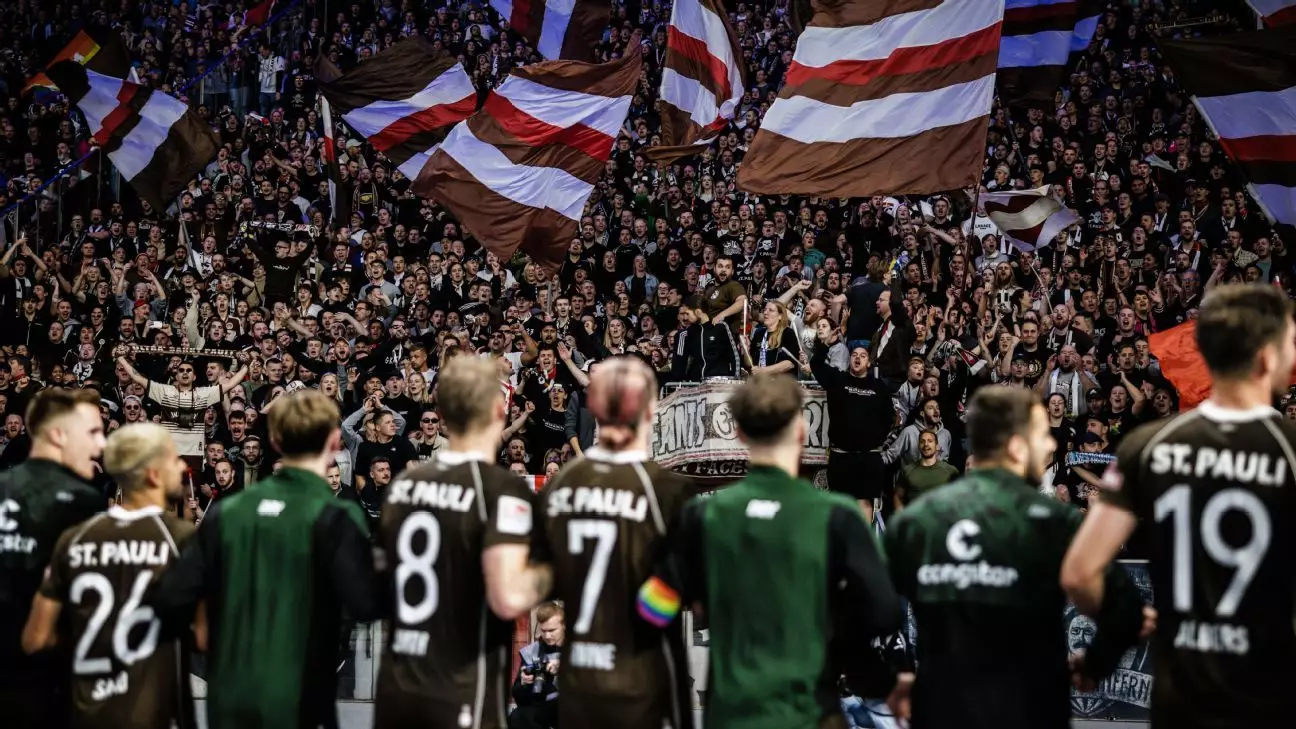As various cultures grapple with the relationship between sport and politics, few places demonstrate a more profound connection than German football, specifically through the lens of FC St. Pauli. Many sports enthusiasts, especially from American and British backgrounds, often claim that the realms of sports and politics should remain distinctly separate. However, those who immerse themselves in German football—and particularly St. Pauli—will find such delineation not just problematic, but perhaps entirely unrealizable. For St. Pauli, football is a remarkably rich expression of community values, contrasting starkly with the often sterile and commercialized view of the sport.
In the heart of Hamburg, St. Pauli’s identity mirrors that of its vibrant neighborhood, which includes the famed Reeperbahn. This unique locality, known for its eclectic mix of nightlife and culture, serves as fertile ground for a football club that prides itself on progressive and leftist ideologies. Established ideals, encapsulated in their club’s founding principles, espouse an unwavering commitment to social justice. Fans of St. Pauli are drawn not just to the game of football but also to the club’s broader ideological stance against racism, sexism, homophobia, and an array of societal injustices. This creates a compelling narrative: to be a fan of St. Pauli is to embrace a worldview that wages a continual fight against oppression in all its forms.
Reflecting upon St. Pauli’s history, one cannot help but acknowledge its evolution from a niche alternative in the 1980s to a powerful force for activism in modern football. Initially distinguished by their engagement with subcultures—like punk music and social issues surrounding homelessness—the club became imbued with a sense of purpose beyond the confines of the football pitch. In those earlier days, when hooliganism often aligned itself with far-right ideologies, St. Pauli emerged as a counter-narrative, leading the charge against hate and fostering solidarity among marginalized communities.
Today, the ambiance surrounding the Millerntor Stadium is far removed from typical corporate football experiences. Within this space, spectators not only cheer for their team but actively attend a vibrant cultural gathering, where music intertwines seamlessly with the football experience. The infectious energy, embodied by the rhythms and songs echoing through the stadium, creates an atmosphere akin to a festival rather than just a sporting event. This compelling mix of sport and celebration attracts fans from across the globe, further deepening St. Pauli’s international allure.
The upcoming match against Bayern Munich encapsulates the spirit of St. Pauli. In the echelons of German football, this is no ordinary fixture. Fans reminisce about an unforgettable season where, despite finishing stone last in the Bundesliga, St. Pauli triumphed over the illustrious Bayern Munich, earning the endearing moniker “Weltpokalsiegerbesieger”—a jubilant clash of poetic whimsy celebrating their remarkable achievement against all odds.
Such evocative memories further enrich the fabric of St. Pauli’s narrative. Their unique camaraderie with Bayern’s fanbase creates a supportive atmosphere during matches, belied by the financial chasm that separates the two clubs—a mere 4% of Bayern’s wage bill hardly leaves room for competitive equivalence. Despite this, St. Pauli, under the stewardship of former Union Saint-Gilloise manager Alexander Blessin, strives to secure their place in the Bundesliga, revealing their resilience through careful recruitment strategies and strong community ties.
An innovative aspect of St. Pauli’s ethos is their recently launched “Genossenschaftsmodell” or cooperative ownership model. By allowing fans to purchase shares and participate in club governance, the barriers inherent in today’s financial landscape are dismantled. Each member, regardless of the number of shares owned, retains an equal vote—a testament to equity that separates them from traditional football financial dynamics tied to wealth.
This cooperative structure embodies a more significant shift in how clubs can operate in contemporary football. By empowering fans, the club seeks to modernize the Millerntor and eliminate debt without catering to the profits of distant investors. This commitment to community ownership enhances the club’s social fabric, where the governance isn’t profit-driven but rooted in activism and collective identity.
As St. Pauli prepares for yet another showdown, their values remain unwavering amidst a politically divided world. The passionate resonance of the club’s ideals and its links to the local community draw in fans who find solace and companionship within its arms. In tumultuous times, football clubs like St. Pauli symbolize not merely sport but a beacon of hope, resilience, and an enduring fight for equality. Ahead of their clash against Bayern Munich, the world will catch a glimpse of a football culture that elevates community and activism above profit and pretense, proving that in football—a game of passion—the heart still beats loudest.

